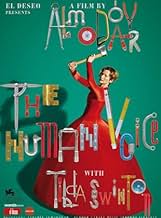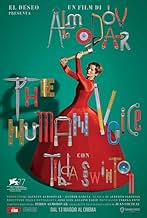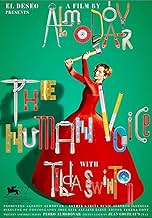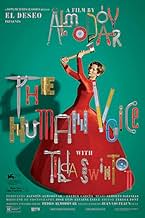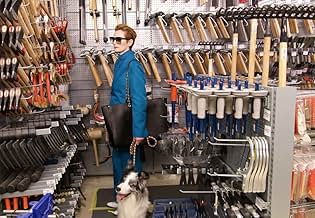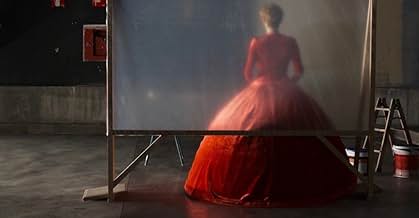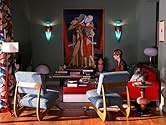AVALIAÇÃO DA IMDb
6,8/10
9,7 mil
SUA AVALIAÇÃO
Adicionar um enredo no seu idiomaA woman watches time passing next to the suitcases of her ex-lover (who is supposed to come pick them up, but never arrives) and a restless dog who doesn't understand that his master has aba... Ler tudoA woman watches time passing next to the suitcases of her ex-lover (who is supposed to come pick them up, but never arrives) and a restless dog who doesn't understand that his master has abandoned him. Two living beings facing abandonment.A woman watches time passing next to the suitcases of her ex-lover (who is supposed to come pick them up, but never arrives) and a restless dog who doesn't understand that his master has abandoned him. Two living beings facing abandonment.
- Direção
- Roteiristas
- Artistas
- Direção
- Roteiristas
- Elenco e equipe completos
- Produção, bilheteria e muito mais no IMDbPro
Avaliações em destaque
Pedro Almodovar's short is, as the credits state - "freely adapted" from a Jean Cocteau stage production. Almodovar retains the central conceit of the play as it essentially is a monologue with a woman on a telephone talking with a lover (the other voice is never heard). Almodovar includes a brief prologue and he winks at the viewer by 'revealing' the artificiality of his own production. He also revels in his usual saturated color schemes.
Fortunately, the woman is played by Tilda Swinton who has to carry the full half hour alone. Almodovar wisely has shaped the material (for the first time in English) around Swinton's talents and she carries it off for the most part, even if some of the eccentricities the Writer-Director don't really work.
Fortunately, the woman is played by Tilda Swinton who has to carry the full half hour alone. Almodovar wisely has shaped the material (for the first time in English) around Swinton's talents and she carries it off for the most part, even if some of the eccentricities the Writer-Director don't really work.
Jean Cocteau's play La Voix Humaine (The Human Voice) opened at the Comédie Française in 1930 as a atar vehicle for Belgian actress Berthe Bovy, then popular in Parisian stages. The work involves a woman, only identified as Elle = She, speaking on the telephone with his lover of several years, who is leaving her.for another woman. Her interlocutor is silent for the duration and we don't even know for sure if he is listening or if the connection has been broken.
The play had an enduring popularity, and has been since in the repertory of many theater companies. It was put on screen several times, among them by Roberto Rossellini (first episode of L'Amore 1946: actress Anna Magnani) and by Ted Kotcheff (1966: actress Ingrid Bergman). It even had a second life as an opera by Francis Poulenc in 1958, which has been as well accepted as the play and is still being staged and recorded.
This being the Almodóvar version, we may expect some off the wall happenings. One is a very funny scene where the protagonist browses for axes in a hardware store that seems to have an unusually large inventory of the item. On another, the axe in question is used in a hilarious way. We are shown mid-movie that She's apartment is actually a set in a sound stage which is perhaps a gentle dig at he artificiality of the play. And, last but not least, we have the director's trademark, cinematography in gloriously saturated colors. Tilda Swinton does an outstanding job as She; she tones down the melodrama and borders on the humorous at times. All in all, a refreshing take on the play and the best version I have seen.
The play had an enduring popularity, and has been since in the repertory of many theater companies. It was put on screen several times, among them by Roberto Rossellini (first episode of L'Amore 1946: actress Anna Magnani) and by Ted Kotcheff (1966: actress Ingrid Bergman). It even had a second life as an opera by Francis Poulenc in 1958, which has been as well accepted as the play and is still being staged and recorded.
This being the Almodóvar version, we may expect some off the wall happenings. One is a very funny scene where the protagonist browses for axes in a hardware store that seems to have an unusually large inventory of the item. On another, the axe in question is used in a hilarious way. We are shown mid-movie that She's apartment is actually a set in a sound stage which is perhaps a gentle dig at he artificiality of the play. And, last but not least, we have the director's trademark, cinematography in gloriously saturated colors. Tilda Swinton does an outstanding job as She; she tones down the melodrama and borders on the humorous at times. All in all, a refreshing take on the play and the best version I have seen.
This has quite a lot to live up to. The 1966 version with Bergman is a masterpiece. Plus this is directed by Pedro Almodóvar AND it's his first English language film. I've been itching to see this for a long time. Delayed like many films due to the pandemic, my expectations have been heightened. Always dangerous going into a film. This was interestingly shot during lockdown, behind the scenes shots showing the crew in masks. I suppose this might be the perfect film project for social distancing. In place of Bergman is Tilda Swinton. She's not in the same intimate setting as her predecessor. In fact she's a lot more freedom, starting browsing axes in a hardware store. The premise is the same though. An unnamed woman, alone after being left by her lover. Only a dog for company. Even here though, things are dialled up, the dog can act! Also pining for the now missing man, seriously the dog is great! What's also great is her apartment. It's gorgeous! Modern clean lines, bold colours. It screams taste and control. Inexplicably though, it's not shown to be a real apartment. It's a set, built in a warehouse-like sound stage. I've not yet decided why, other than it looks wonderful as we see aerial shots, Swinton moving from room to roofless room smashing things in anger and frustration. We're a third way in before the phone rings. This time an iPhone with AirPods. Here we get closer to Bergman's portrayal. The monologue taking centre stage as Swinton wanders in and out of hers. It's a much more stylised interpretation and feels a little soulless in places for it, but it still works. The relationship described is much more modern, less traditional, less conservative, but the emotions are just as raw and Swinton delivers with just as effective might. Is it better than the 1966 version? No, but I think it might be as good, or very very close. I might need to watch it a few times to appreciate it fully. Swinton though is undoubtably brilliant and Almodóvar has updated the premise with all the invention you'd expect. It might even have a better ending. My expectations were high and I wasn't disappointed.
A mature woman (Tilda Swinton) watches time passing next to the suitcases of her ex-lover -who is supposed to come pick them up, but never arrives- and a restless dog who doesn't understand that his master has abandoned him. The woman at first speaks calmly, but once the conversation goes on, things get worse, and anger and a certain hysteria emerge from her mouth. We watch two living beings facing abandonment.
Almodóvar presents his first film entirely in English, a 30-minute short film with the absolute leading role of the great Tilda and dealing with heartbreak as a backdrop, a torn monologue based on Cocteau's play, in which the author Frances showed the sadness, the rage, the helplessness, the helplessness and a thousand other emotions of a love breakup. In which the long-time British actress shows a whole catalog of feelings through a telephone conversation in which the other party cannot be heard. This prestigious British actress of androgynous beauty has a notorious career. She has played both women and men. She doesn't always play women; she has played Mozart on stage, an Elizabethan nobleman in Orlando (1992) and an androgynous angel, Gabriel, in Constantine (2005). Tilda Swinton is a frequent collaborator of Luca Guadagnino with whom she has worked in five productions: The Protagonists (1999), Tilda Swinton: The Love Factory (2002), Io sono l'amore (2009), A bigger splash (2015) and Suspiria (2018), together they also created the concept of the short film Here (2012).
Also worth highlighting is the excellent work of two of Almodovar's regular collaborators: cameraman José Luis Alcaine in the photography and the Oscarized composer Alberto Iglesias in music. Being a project produced by Pedro Almodovar himself y his brother Agustin Almodovar, the latter has a bit role as a shopkeeper. Later on, Pedro would make a second short film in English: Extraña forma de vida (Strange Way of Life) with Ethan Hawke and Pedro Pascal. Previously Pedro Almodóvar had directed successful films, some of them Oscar-winning, among which the following can be highlighted: Dolor y gloria, La piel que habito, Hable con ella, Carne trémula, Tacones lejanos, Átame, La Flor de mi secreto, Mujeres al borde de un ataque de nervios, La Ley del Deseo.
Almodóvar presents his first film entirely in English, a 30-minute short film with the absolute leading role of the great Tilda and dealing with heartbreak as a backdrop, a torn monologue based on Cocteau's play, in which the author Frances showed the sadness, the rage, the helplessness, the helplessness and a thousand other emotions of a love breakup. In which the long-time British actress shows a whole catalog of feelings through a telephone conversation in which the other party cannot be heard. This prestigious British actress of androgynous beauty has a notorious career. She has played both women and men. She doesn't always play women; she has played Mozart on stage, an Elizabethan nobleman in Orlando (1992) and an androgynous angel, Gabriel, in Constantine (2005). Tilda Swinton is a frequent collaborator of Luca Guadagnino with whom she has worked in five productions: The Protagonists (1999), Tilda Swinton: The Love Factory (2002), Io sono l'amore (2009), A bigger splash (2015) and Suspiria (2018), together they also created the concept of the short film Here (2012).
Also worth highlighting is the excellent work of two of Almodovar's regular collaborators: cameraman José Luis Alcaine in the photography and the Oscarized composer Alberto Iglesias in music. Being a project produced by Pedro Almodovar himself y his brother Agustin Almodovar, the latter has a bit role as a shopkeeper. Later on, Pedro would make a second short film in English: Extraña forma de vida (Strange Way of Life) with Ethan Hawke and Pedro Pascal. Previously Pedro Almodóvar had directed successful films, some of them Oscar-winning, among which the following can be highlighted: Dolor y gloria, La piel que habito, Hable con ella, Carne trémula, Tacones lejanos, Átame, La Flor de mi secreto, Mujeres al borde de un ataque de nervios, La Ley del Deseo.
The dog is identified in the film credits at the end, but oddly not here - his name is Dash. And he does a great job.
Você sabia?
- CuriosidadesThis is Pedro Almodóvar's first film in English.
- ConexõesFeatured in Projector @ LFF: One Night in Miami/The Human Voice (2020)
Principais escolhas
Faça login para avaliar e ver a lista de recomendações personalizadas
Detalhes
Bilheteria
- Faturamento bruto mundial
- US$ 164.623
- Tempo de duração30 minutos
- Cor
- Mixagem de som
- Proporção
- 1.85 : 1
Contribua para esta página
Sugerir uma alteração ou adicionar conteúdo ausente

Principal brecha
By what name was A Voz Humana (2020) officially released in India in English?
Responda
![Assistir a Tráiler [OV]](https://m.media-amazon.com/images/M/MV5BYzQyNTRjNDMtMDU3MS00M2M2LWIwMDQtYThjNTllZmE2ZWQ2XkEyXkFqcGdeQXRyYW5zY29kZS13b3JrZmxvdw@@._V1_QL75_UX500_CR0)


